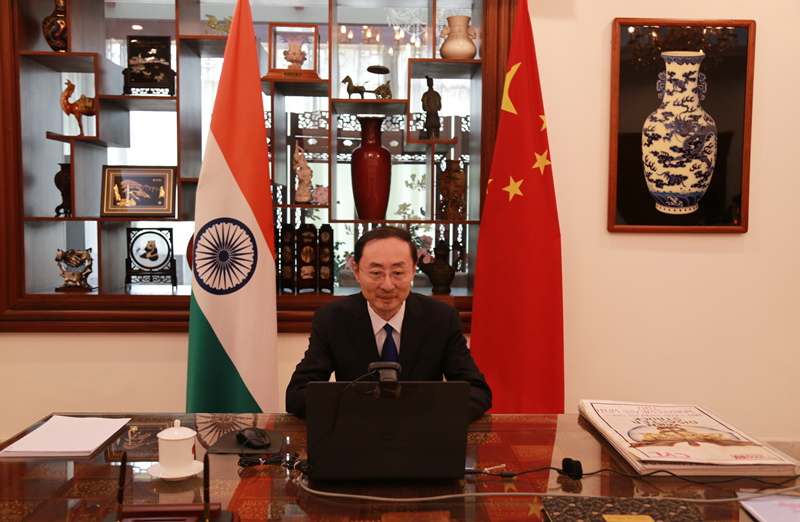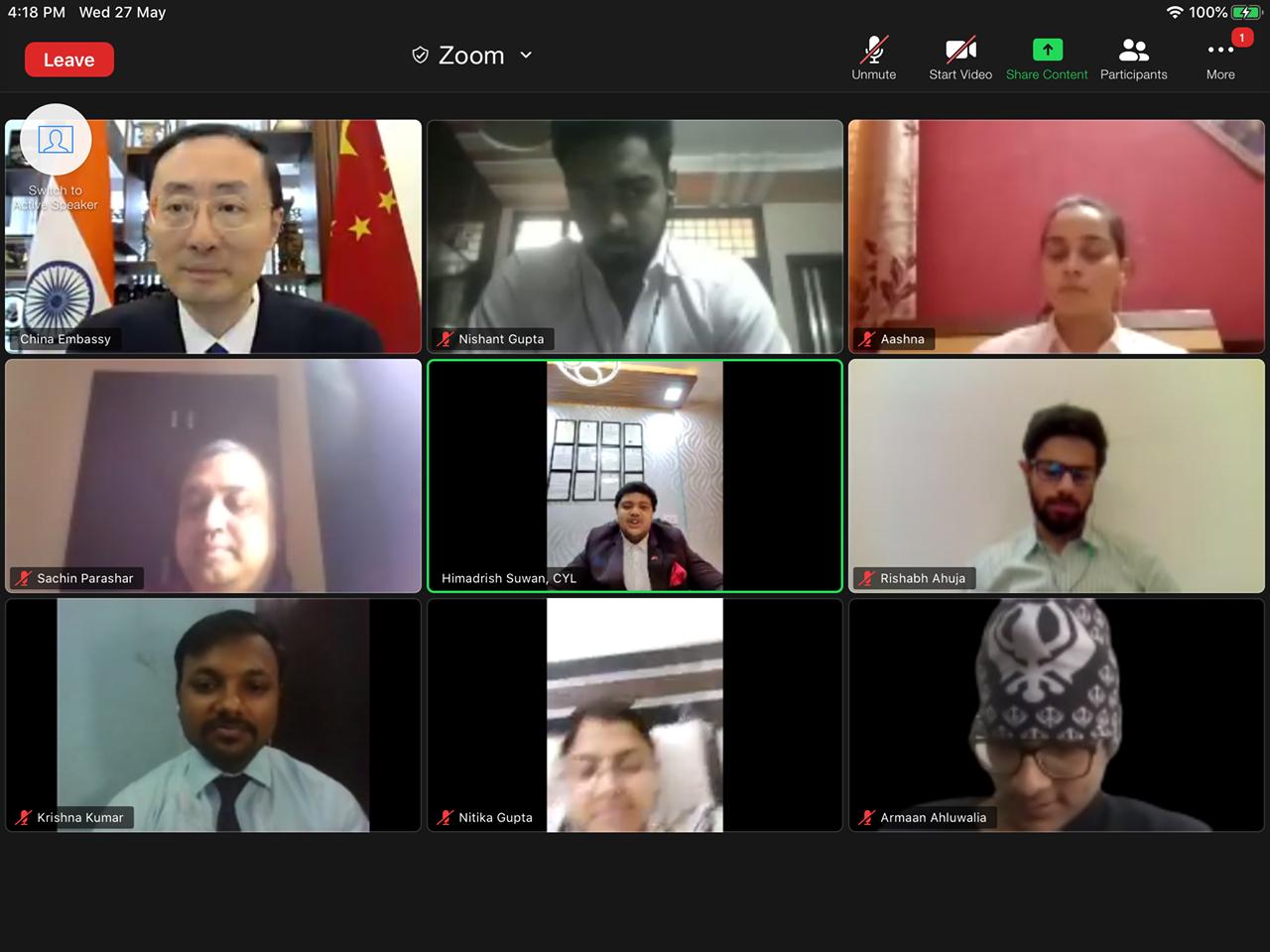|

On May 27, 2020, Chinese Ambassador to India H.E. Sun Weidong held a webinar with Indian youth. Ambassador Sun delivered remarks on China’s experiences and China-India cooperation in fighting against the COVID-19, and interacted with Indian youth online. Chairman of Confederation of Young Leaders (CYL) Mr. Himadrish Suwan hosted the webinar. More than 70 youth representatives from all over India and journalists from Indian and Chinese media were present.
The transcript of the interactive session is as follows:
Q:What do you think is the most important reason for China's victory over the epidemic?
A: I think China's success first attributes to the strong leadership of the Communist Party of China. President Xi Jinping have repeatedly asked Party committees and governments at all levels to put people’s health and life first and take effective measures to contain the spread of COVID-19. Responding to President Xi’s call, Party members have stood up and fought bravely in time of crisis. Dr. Zhang Wenhong is the head of the Shanghai medical treatment team. When talking about his team work, he has a famous saying that “Party members should stand up first, no bargain!". Among 496 medical workers, civil servants and volunteers who died at their post on the frontline against COVID-19, 328 were CPC members.
The unity of the Chinese people is also an important reason for our success. The Chinese government mobilized the whole nation to fight the epidemic, and all Chinese people rallied together. More than 2 million citizens registered to be volunteers. Almost every community across China set up 24-hour checkpoints, for taking temperatures and controlling personnel access. Many community volunteers visited and took care of those vulnerable residents including the elderly. In our country of 1.4 billion people, the same scene was staging in every street, every community and every village. Without the dedication and sacrifice of the Chinese people, we could not have brought the epidemic under control in around two months.
Q:What do you think of the Indian government's capacity and response to the outbreak?
A:After the outbreak of the epidemic, the Indian government attached great importance and took decisive measures. I am impressed with several things. The first is swift action. Since March 25, the Indian government has taken lockdown measures in different stages, even though there were not many confirmed cases at that time. The second is solidarity. People across all sectors in India reach basic consensus on epidemic prevention and control, understand and support the lockdown measures. The third is cooperation. The majority of the Indian people follow government instructions and advice to stay at home, and the overall social order has been stable since the lockdown.
At present, we feel heavy-hearted and empathy while India’s epidemic situation is getting more severe. The Indian government is taking various measures to strengthen its anti-epidemic capacity, such as accelerating the procurement of anti-epidemic materials, strengthening the medical facilities and response capacity, encouraging vaccine research and development, and carrying out international cooperation. We sincerely wish India success in its fight against the epidemic. We will continue to provide assistance to India within our capacity.
Q:Celebrations for the 70th anniversary of China-India diplomatic relations have been put on pause during the pandemic. If the situation improves in the next few months, please tell us about what is planned for the rest of the year?
A:This year marks the 70th anniversary of the establishment of diplomatic relations between China and India. On April 1, Chinese President Xi Jinping, Premier Li Keqiang, State Councilor and Foreign Minister Wang Yi exchanged congratulatory messages with Indian President Ram Nath Kovind, Prime Minister Narendra Modi and External Affairs Minister Subrahmanyam Jaishankar respectively. President Xi pointed out China-India relations are now standing at a new starting point and facing new opportunities. PM Modi said the two countries should strengthen coordination and solidarity and address global challenges together.
Despite the impact of the epidemic, we still try our best to celebrate the 70th anniversary in various ways. I delivered a video speech on April 1, and published my articles on both Chinese and Indian media around that time. The Chinese Embassy published a Special Page on Indian media and sent the commemorative covers to our Indian friends. While fighting the COVID-19 together, we will continue to explore different ways to hold more “cloud celebrations”. Good things are never too late to come. Taking the celebration of the 70th anniversary as an opportunity, we would like to work with India to elevate our bilateral relations to a new height.
In early January this year, The Chinese Embassy and CYL co-hosted the China-India Youth Dialogue 2020. This was the first event held by the Embassy celebrating the 70th anniversary. Recently, All-China Youth Federation and CYL also co-hosted a webinar with the theme of the 70th anniversary. These events were very successful. I would like to take this opportunity to extend our thanks to CYL again.

Q:What is your message for the young people amidst the COVID-19 crisis? How could the young people together cooperate and collaborate for a more vibrant partnership between China and India?
A:While fighting COVID-19, China and India are also facing the important task to consolidate and strengthen bilateral relations. I hope that the youth of our two countries could realize the importance of developing China-India relations and deepen your understanding of the important consensus reached by our two leaders. We should adhere to the basic judgment that China and India are each other's opportunities and pose no threat to each other. We need to see each other's development in a correct way and enhance strategic mutual trust. We should correctly view our differences and never let the differences shadow the overall situation of bilateral cooperation. At the same time, we should gradually seek understanding through communication and constantly resolve differences. From any perspective, China and India should be good neighbors of harmonious coexistence and good partners to move forward hand in hand.
The realization of "Dragon and Elephant dancing together" is the only right choice for China and India, which serves the fundamental interests of our two countries and two peoples. As the two major emerging economies, China and India should strengthen practical cooperation in investment, production capacity and other fields, and expand the cake of common interests. China hopes to develop itself and India as well. The two countries should help each other to accomplish their respective goals and "light up" each other.
President Xi Jinping pointed out that "young people should become the new force promoting friendship between our two peoples." I hope the youth of China and India will contribute more wisdom and strength to promoting China-India friendship and the development of bilateral relations.
Here I have several suggestions, First, actively voice your support for China-India friendship. Call on all parties to make concrete efforts to implement the consensus reached by our two leaders. Second, make contributions in various fields and promote win-win cooperation between China and India. Third, strengthen people-to-people and cultural exchanges and dialogue among civilizations. Constantly broaden your horizons, enhance mutual learning, mutual understanding and mutual trust.
Q:By when could we expect a vaccine for COVID-19?
A:President Xi Jinping addressed the Opening of the 73rd World Health Assembly and announced important proposals to boost global fight against COVID-19. He said that COVID-19 vaccine development and deployment in China, when available, will be made a global public good, and this will be China’s contribution to ensuring vaccine accessibility and affordability in developing countries.
At present, China has made great progress on vaccine research and development. China has simultaneously promoted vaccine research and development through five technical routes. It is reported that eight novel coronavirus vaccine candidates are in clinical trial while four from China. On May 22, the Chinese team led by Chen Wei, an Academician of the Chinese Academy of Engineering, published a report on the world-known medical journal Lancet. The phase-1 trial results of their vaccine candidate on humans prove to be safe and effective. This result is encouraging.
In the process of vaccine research and development, China and international organizations such as the WHO have carried out close cooperation. Some Chinese companies have also carried out active cooperation with relevant international institutions. We expect the vaccine to come into use as soon as possible.
Q:What is the one thing you like about India the most?
A:What I like India most is the optimistic and peaceful character of the Indian people as well as the ancient and splendid Indian civilization. Through Bollywood movies, we could often find that so many Indians are optimistic and confident, enthusiastic and passionate, sociable and good at singing and dancing. Indian civilization is colorful, inclusive and diverse. Since ancient times, the Indian subcontinent has been like a sea, where different cultures have been converging, and finally the Indian civilization has been developed. India is known as the museums of races, languages and religions. Its diversity of ethnicity, language, culture and religion is very distinctive. The inclusiveness and diversity of Indian civilization are impressive and worth learning. As two ancient civilizations in the world, China and India should learn from each other, jointly write a great chapter of exchanges and mutual learning among different civilizations.

|